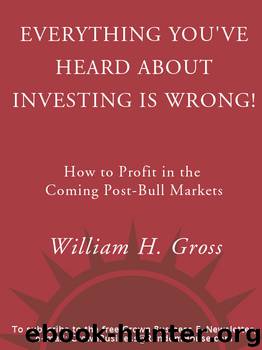Everything You've Heard About Investing Is Wrong! by Bill Gross

Author:Bill Gross [Gross, William H.]
Language: eng
Format: epub
ISBN: 978-0-307-81594-1
Publisher: Crown Publishing Group
Published: 2012-03-28T04:00:00+00:00
Lessons from Las Vegas
My scalping was one of the seminal events of my life. The operations that followed made me vow to stay out of the hospital for as long as possible thereafter, and I’ve been a fitness aficionado ever since. The time I spent in the hospital also allowed me to while away the hours learning a recently devised system for playing blackjack. It was that experience, as you’ll soon find out, that eventually led to my career in the bond market. Of course, I’m not recommending a scalping for any of my readers—either in or out of the market—but my scalping ultimately led to my career, and for that, at least in retrospect, I’m more than grateful.
After leaving the hospital and graduating from Duke University in June 1966, my goal was to win some money playing blackjack. I was about to become one of Las Vegas’s first card-counting blackjack players, following the initial efforts of a real pro and the originator of blackjack theory, Ed Thorpe. I had no clue that my four months at the tables in Vegas were to lay the foundation for a successful career on Wall Street. But what I learned there taught me several important principles that I’ve employed for the past twenty-five years at PIMCO, and I figure if they’ve worked for me, they can work for you, too.
Professional blackjack utilizes a system of counting cards. If you know what cards are left in the deck, you can determine whether the odds are in your favor or lean toward the house. Most of the time, of course, the casino is favored, but there are instances when the deck favors the player and it’s at those times that making large bets will tilt the overall long-term odds toward the player. Knowing when to strike with a big bet, however, is no guarantee of success, because even when the odds favor the player, they still only lean in his direction. If you accept that reality, it would be foolish to shove all of your money out onto the table for any one play of the cards. Fifty-two percent of the time you might double your money, but 48 percent of the time you’ll be wiped out. That’s the type of gambling casinos thrive on because it typifies poor money management.
No, when the odds are in your favor, your bet has to be large, but not so big that it jeopardizes your bankroll or your nest egg, as the case may be. The theory is formally labeled “gambler’s ruin” but it might well be called “portfolio diversification.” Long before Harry Markowitz at UCLA dreamed up the theory of diversified risk that eventually won him a Nobel Prize in economics, blackjack players were onto the same principle: you must not bet all your chips at one time, because if you’re wrong, the results will be disastrous.
Think what this implies when it’s applied in the investment arena. Obviously, it means that you don’t want to own just
Download
This site does not store any files on its server. We only index and link to content provided by other sites. Please contact the content providers to delete copyright contents if any and email us, we'll remove relevant links or contents immediately.
Rich Dad Poor Dad by Robert T. Kiyosaki(6612)
Pioneering Portfolio Management by David F. Swensen(6288)
How To Win Friends and Influence People by Dale Carnegie(4502)
The Money Culture by Michael Lewis(4198)
The Dhandho Investor by Mohnish Pabrai(3759)
The Wisdom of Finance by Mihir Desai(3735)
Liar's Poker by Michael Lewis(3441)
Fooled by Randomness: The Hidden Role of Chance in Life and in the Markets by Nassim Nicholas Taleb(3105)
The ONE Thing by Gary Keller(3066)
The Intelligent Investor by Benjamin Graham Jason Zweig(3036)
Mastering Bitcoin: Programming the Open Blockchain by Andreas M. Antonopoulos(3035)
The Psychology of Money by Morgan Housel(2980)
Rich Dad Poor Dad: What The Rich Teach Their Kids About Money - That The Poor And Middle Class Do Not! by Robert T. Kiyosaki(2949)
Investing For Dummies by Eric Tyson(2948)
How to Day Trade for a Living: Tools, Tactics, Money Management, Discipline and Trading Psychology by Andrew Aziz(2944)
How to Win Friends and Influence People by Dale Carnegie(2912)
Market Wizards by Jack D. Schwager(2697)
How to Pay Zero Taxes, 2018 by Jeff A. Schnepper(2646)
Zero Hour by Harry S. Dent Jr. & Andrew Pancholi(2645)
